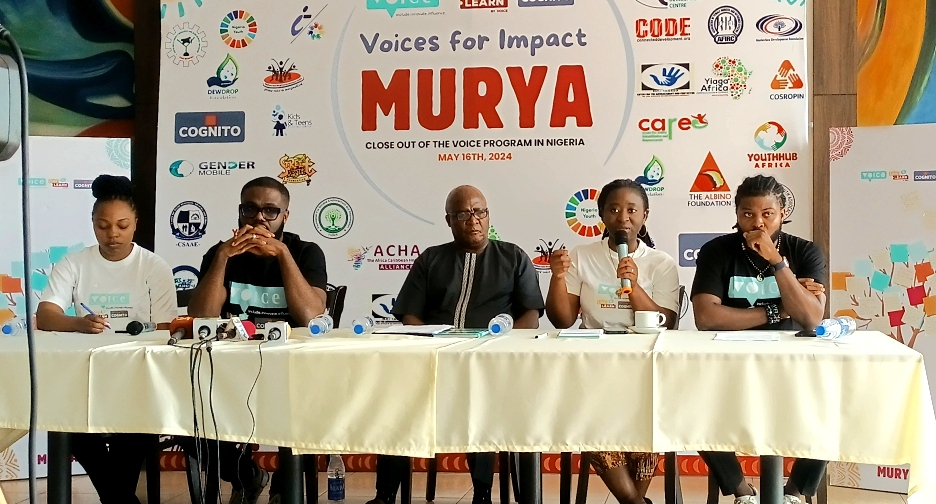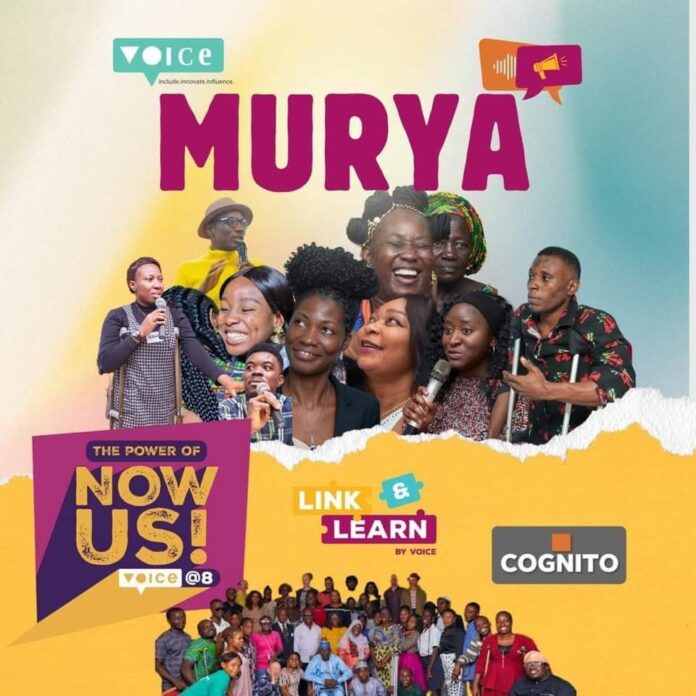Voice Initiative Empowers Over Two Million Nigerians Through Human Rights Interventions
Abuja, Nigeria – Over the past eight years, the Voice Global initiative, implemented by Oxfam Nigeria, has profoundly impacted the lives of at least two million Nigerians, including women, girls, persons with disabilities (PWDs), and other vulnerable groups. This milestone was celebrated during the Voice initiative’s 8th-anniversary event, aptly named ‘Murya,’ a Hausa term meaning ‘voice.’
The Close Ceremony took centre stage on Thursday, where all voice grantees, partners and friends gathered at Abuja Continental Hotel, to celebrate eight years of impactful human rights- intervention in the lives of millions of Nigerians.
The initiative has championed humanitarian interventions across diverse settings, including universities, custodial centers, rural resettlements, and urban slums. This extensive reach was highlighted in a joint statement signed by key figures involved in the project: John Makina, Oxfam Country Director in Nigeria; Akom Nya, Voice Nigeria Project Coordinator; Anne Mulehi, Voice Global Representative; Cedric Owuru, Voice Linking and Learning Amplifier Officer; and Christy Asala, Cognito Executive Director.

A Decade of Empowerment and Advocacy
Voice, an innovative grant facility, is designed to empower marginalized and discriminated groups by enhancing their access to essential services and enabling their participation in political processes. This mission aligns with the ‘Nothing about us without us’ (Now-Us) mantra, emphasizing that every individual has a voice that deserves to be heard and amplified.
The initiative operates within a dynamic and often restrictive civic environment, working tirelessly to overturn the negative narratives of marginalization and vulnerability. Despite these challenges, Voice supports efforts to build a more inclusive and hopeful future, actively functioning in ten countries across Africa and Asia.
A Global and Collaborative Effort
Funded by the Ministry of Foreign Affairs of the Netherlands, Voice is part of the ‘Dialogue and Dissent’ policy framework, soon to transition to the ‘Power of Voices’ framework. The program is managed by a consortium comprising Oxfam Novib and Hivos, two prominent organizations known for their work in international development.
Hivos oversees the program in Indonesia, the Philippines, Kenya, and Tanzania, while Oxfam Novib manages operations in Laos, Cambodia, Uganda, Niger, Mali, and Nigeria. This collaborative effort ensures that the initiative’s reach and impact are both broad and deep, addressing the unique needs of marginalized groups in diverse cultural and socio-political contexts.
Celebrating Achievements and Highlighting Impact
During the closeout press conference held on Friday, May 18, in Abuja, the significant achievements of the Voice Project were brought to the forefront. Hosted by Cognito, a grantee of the Voice Project, the conference showcased the initiative’s transformative work over the past year.
Voice has directly engaged with 51 organizations and indirectly supported over 150, impacting more than 100 communities across Nigeria. These efforts have not only provided essential resources but also created platforms for marginalized groups to amplify their voices and advocate for their rights.
A Wide Range of Initiatives
The Voice Project has funded a variety of initiatives, each tailored to address specific issues faced by marginalized communities. These include projects aimed at amplifying the voices of people in correctional centers, empowering persons with disabilities, supporting indigenous women, and enabling youth to challenge the status quo through their talents.
Other notable initiatives have addressed sensitive issues such as “Sex for Grade,” economic empowerment of female prisoners, societal consciousness through film, advocacy for social change through art, and enhancing access to air transportation for persons with disabilities. The project has also supported young people in political endeavors, advocated against violence towards women, and fought against age discrimination.
Linking and Learning: A Core Component
Cedric Owuru, Voice Linking and Learning Amplifier Officer, emphasized the importance of the Linking and Learning component, which has been integral to the project’s success. “This approach provides opportunities for grantees to network, share ideas, and strengthen their capacities,” Owuru explained. “It fosters a collaborative environment where participants can learn from each other’s experiences and implement innovative solutions to common challenges.”
A Legacy of Empowerment
Christy Asala, Executive Director of Cognito, praised the project’s achievements, noting that the Linking and Learning component has been particularly prolific. “We have facilitated four thriving Communities of Practice, hosted six Link and Learn events, and conducted 30 coaching sessions,” Asala said. “Our efforts have created an environment where all participants feel free to share, learn, and grow.”
The Voice Project’s legacy of empowerment and advocacy is encapsulated in its recently published compilation, “MURYA,” which documents the program’s impact in Nigeria over the past eight years. This and other publications highlight the project’s success in promoting human rights and inclusion.
A Call to Action
As the Voice Project concludes its current phase, the achievements and lessons learned over the past eight years will continue to inspire and guide efforts towards a more inclusive society. The project has set a new standard for human rights advocacy, demonstrating that with support and empowerment, marginalized groups can become powerful agents of change.
The journey of the Voice Project serves as a powerful reminder that when every voice is heard, and every individual is empowered, society as a whole can achieve greater equity and justice.


